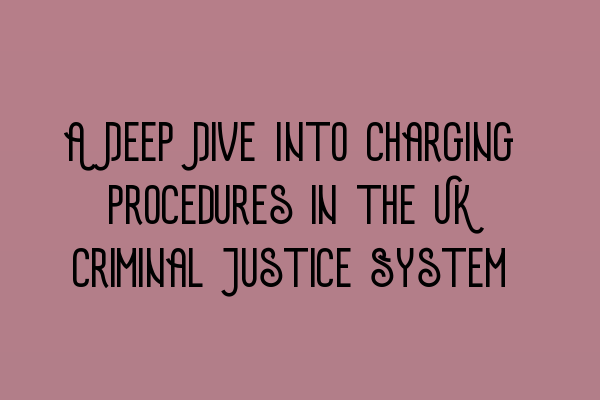A Deep Dive Into Charging Procedures in the UK Criminal Justice System
In the United Kingdom, the criminal justice system operates on well-established charging procedures that are crucial in determining whether a person should face criminal charges. Understanding these procedures is essential for legal professionals and aspiring solicitors, as it forms one of the core areas of the SQE Criminal Law & Practice exam.
What are Charging Procedures?
Charging procedures refer to the steps taken by the police and Crown Prosecution Service (CPS) to determine if there is enough evidence to bring criminal charges against an individual. These procedures ensure that justice is served, and individuals are not unfairly subjected to court proceedings.
It is important to note that charging decisions are made by the CPS rather than the police. The CPS evaluates the evidence provided by the police and decides whether to proceed with formal charges or not.
The Role of the Police in Charging Procedures
The police play a vital role in charging procedures. When investigating a crime, the police gather evidence, interview witnesses, and collect any relevant information. Once they believe they have enough evidence, they present it to the CPS. The police act as the initial gatekeepers, determining whether a case should proceed further.
However, it is important to remember that the police do not have the authority to formally charge an individual. Their role is to investigate and gather evidence, leaving the final decision to the CPS.
The Crown Prosecution Service (CPS)
The Crown Prosecution Service (CPS) is responsible for determining whether there is enough evidence to prosecute an individual and bringing formal charges against them. The CPS evaluates the evidence provided by the police and conducts a thorough review to ensure that it meets the necessary standards.
Once the CPS is satisfied with the evidence, they will decide to bring charges. However, if the evidence is insufficient or there are legal issues surrounding the case, they may decide not to proceed. This decision-making process ensures that only cases with a reasonable chance of success are pursued in court.
Types of Charges
In the criminal justice system, charges are categorized into two types: summary offenses and indictable offenses.
Summary offenses are less serious crimes that are usually heard in a Magistrates’ Court. These offenses include minor offenses such as petty theft or driving offenses.
Indictable offenses, on the other hand, are more serious crimes that are heard in the Crown Court. These offenses include offenses such as robbery, murder, or serious fraud.
The Charging Decision
Once all the evidence has been gathered and reviewed, the CPS will make a charging decision. This decision can result in one of the following outcomes:
- No Further Action (NFA): If the CPS determines that there is insufficient evidence or that it is not in the public interest to proceed, they will take no further action.
- Adult Caution: In less serious cases, the CPS may decide to administer an adult caution. This is a formal warning given to the offender without the need for prosecution.
- Charge: If the CPS believes that there is enough evidence to prosecute, they will bring formal charges against the individual.
It is essential to note that the charging decision can have a significant impact on the individual’s life, as criminal charges can lead to severe consequences such as imprisonment, fines, or the creation of a criminal record.
Conclusion
Charging procedures play a vital role in the UK criminal justice system, ensuring that individuals are treated fairly and brought to court only when there is sufficient evidence to support their charges. The police and CPS work together to gather evidence, evaluate it, and make charging decisions accordingly.
To delve deeper into the intricacies of criminal law and practices such as charging procedures, it is highly recommended to explore additional resources and preparatory courses such as:
- SQE 1 Practice Exam Questions
- SQE 1 Practice Mocks FLK1 FLK2
- SQE 2 Preparation Courses
- SQE 1 Preparation Courses
- SRA SQE Exam Dates
By utilizing these resources, legal professionals and aspiring solicitors can enhance their understanding of criminal law and excel in their legal career.
